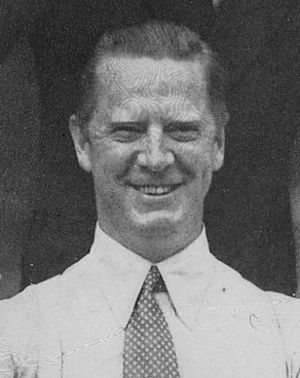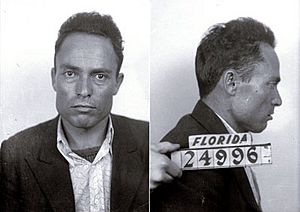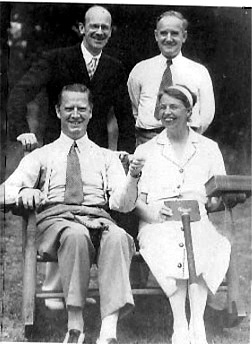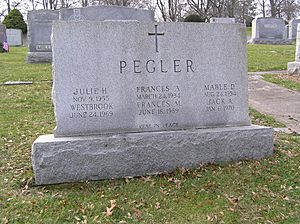Westbrook Pegler facts for kids
Quick facts for kids
Westbrook Pegler
|
|
|---|---|

Pegler in 1938
|
|
| Born | Francis James Westbrook Pegler August 2, 1894 Minneapolis, Minnesota, U.S. |
| Died | June 24, 1969 (aged 74) Tucson, Arizona, U.S. |
| Pen name | Westbrook Pegler |
| Occupation | syndicated newspaper columnist |
| Spouse | Julia Harpman Pegler (first), Maude Wettje Pegler (second) |
Francis James Westbrook Pegler (born August 2, 1894 – died June 24, 1969) was an American journalist and writer. He was very popular in the 1930s and 1940s. He was known for disagreeing with the New Deal and labor unions.
Pegler often wrote critically about presidents from both major parties. These included Herbert Hoover, Franklin D. Roosevelt, Harry Truman, and John F. Kennedy. He also spoke out against the Supreme Court, the tax system, and dishonest labor unions. In 1962, he lost his job with King Features Syndicate because he started criticizing the company's owners. His later articles appeared in other publications, like American Opinion.
Contents
About Westbrook Pegler
Westbrook Pegler was born on August 2, 1894, in Minneapolis, Minnesota. His father, Arthur James Pegler, was a local newspaper editor.
Pegler's Career in Journalism

Westbrook Pegler was one of the youngest American war reporters during World War I. He worked for United Press Service. In 1918, he joined the United States Navy. The next year, in 1919, he became a sports writer for United News in New York.
In 1925, Pegler started working for the Chicago Tribune. In 1933, he joined the Scripps Howard newspaper group. There, he became good friends with Roy W. Howard. Pegler's column, "Mister Pegler," gained many readers.
In 1941, he won a Pulitzer Prize. This award was for showing how crime groups were involved in labor unions. In the same year, he was ranked third for Time Magazine's "Man of the Year". Only Franklin Roosevelt and Joseph Stalin were ranked higher.
In 1944, Pegler moved his column to Hearst's King Features Syndicate. He continued to write for them until 1962.
Views on Franklin Roosevelt
Pegler first supported President Franklin Delano Roosevelt. But after seeing the rise of dictatorships in Europe, he worried about similar dangers in America. He became a strong critic of Roosevelt's government. He felt they were using too much power.
After this, he often criticized Roosevelt, his wife Eleanor Roosevelt, and Vice President Henry A. Wallace. Pegler's views became more conservative. He was upset by the New Deal's support for labor unions. He believed these unions were dishonest and politically corrupt.
Disagreement with the New Deal
In the 1930s and 1940s, Pegler was a key voice against the New Deal. He also opposed its allies in the labor movement, like the National Maritime Union. He compared union supporters of the "closed shop" (where only union members can be hired) to Hitler's followers.
Pegler believed that dishonest labor leaders were the biggest threat to the country. By the 1950s, he spoke even more strongly. He suggested that the government should take over the AFL and CIO unions to "smash" them. He wrote that this would be a form of "fascism," but he saw benefits in it.
Feud with Eleanor Roosevelt

After 1942, Pegler regularly attacked Franklin and Eleanor Roosevelt. He called Mrs. Roosevelt "La boca grande," which means "the big mouth." The Roosevelts usually ignored his writings in public.
Pegler continued to dislike Eleanor Roosevelt throughout his life. He often wrote about it in his column.
Pulitzer Prize and Activism
In 1941, Pegler became the first columnist to win a Pulitzer Prize for reporting. This was for his work exposing crime in Hollywood labor unions. He focused on the criminal actions of Willie Bioff. He also showed the connection between organized crime and unions.
Pegler's reporting led to the conviction of George Scalise. Scalise was the president of the Building Service Employees International Union and had ties to organized crime. He was found guilty of labor racketeering and sent to prison.
Historian David Witwer said that Pegler "showed a world where criminals, corrupt union officials, Communists, and their political friends in the New Deal threatened the financial freedom of working Americans."
In 1947, Pegler started a campaign about the "Guru Letters" of former Vice-President Henry A. Wallace. Pegler claimed these letters showed Wallace was not fit to be president. He called Wallace a "messianic fumbler" and "off-center mentally."
Personal Life and Death
On August 28, 1922, Pegler married Julia Harpman. She was a crime reporter for the New York Daily News. She passed away on November 8, 1955. In 1961, he married his secretary, Maude Wettje.
Westbrook Pegler died at age 74 on June 24, 1969, in Tucson, Arizona. He died from stomach cancer. He is buried in the Cemetery of the Gate of Heaven in Hawthorne, New York.
Awards
- 1941: Pulitzer Prize for his reporting on labor racketeers.
Writings
Pegler's agent for his books was George T. Bye. Bye was also the agent for Eleanor Roosevelt.
Pegler published three books of his collected writings:
- T'ain't Right, 1936
- The Dissenting Opinions of Mister Westbrook Pegler, 1938
- George Spelvin, American and Fireside Chats, 1942
See also
- Will H. Kindig


